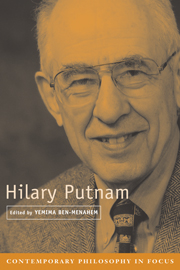Book contents
- Frontmatter
- Contents
- List of Contributors
- Acknowledgments
- 1 Introduction
- 2 Putnam's “The Meaning of ‘Meaning’”: Externalism in Historical Context
- 3 The Face of Perception
- 4 Realism, Beyond Miracles
- 5 Putnam on Skepticism
- 6 The Tale of Quantum Logic
- 7 Another Philosopher Looks at Quantum Mechanics, or What Quantum Theory Is Not
- 8 Structural Realism and Contextual Individuality
- 9 The Rise and Fall of Computational Functionalism
- 10 The Pragmatic Turn: The Entanglement of Fact and Value
- Index
- References
10 - The Pragmatic Turn: The Entanglement of Fact and Value
Published online by Cambridge University Press: 08 January 2010
- Frontmatter
- Contents
- List of Contributors
- Acknowledgments
- 1 Introduction
- 2 Putnam's “The Meaning of ‘Meaning’”: Externalism in Historical Context
- 3 The Face of Perception
- 4 Realism, Beyond Miracles
- 5 Putnam on Skepticism
- 6 The Tale of Quantum Logic
- 7 Another Philosopher Looks at Quantum Mechanics, or What Quantum Theory Is Not
- 8 Structural Realism and Contextual Individuality
- 9 The Rise and Fall of Computational Functionalism
- 10 The Pragmatic Turn: The Entanglement of Fact and Value
- Index
- References
Summary
If one wanted to write a history of the most important and exciting philosophic debates of the past half-century, there is no better place to begin than with the writings of Hilary Putnam. His philosophic range is enormous and deep. In the philosophy of science, logic, mathematics, language, mind, perception, epistemology, and metaphysics, Putnam's challenging and controversial claims have been at the very center of discussion. He has critically engaged virtually every major contemporary Anglo-American and Continental philosopher. He frequently brings to his philosophical encounters a subtle knowledge of the history of philosophy that reaches back to Classical Greek philosophy. The variety of theses that he has defended, revised, and sometimes abandoned can strike one as bewildering. But a careful reading of his works reveals an underlying coherence to the philosophic vision he has been articulating – one that is genuinely dialectical in the sense that we can see why he advocated certain theses and his reasons for revising, correcting, and even abandoning them. We can also detect what he seeks to preserve and integrate in his ongoing philosophical journey. “Philosophers,” he tells us “have a double task: to integrate our various views of our world and ourselves …, and to help us find a meaningful orientation in life. Finding a meaningful orientation in life is not, I think, a matter of finding a set of doctrines to live by, although it certainly includes having views; it is much more a matter of developing a sensibility” (Putnam 1997, p. 52).
- Type
- Chapter
- Information
- Hilary Putnam , pp. 251 - 266Publisher: Cambridge University PressPrint publication year: 2005
References
- 1
- Cited by

